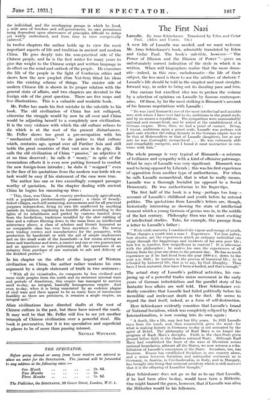The First Nazi
Lassalle. By Arno Schirokauer. Translated by Eden and Cedar Paul. (Allen and Unwin. 15s.) A NEW life of Lassalle was needed, and we must welcome Mr. Arno Schirokauer's book, admirably translated by Eden and Cedar Paul. The book's sub-title, however—" The Power of Illusion and the Illusion of Power "—gives an unfortunately correct indication of the style in which it is written. When will biographers realize that the more dram- atic—indeed, in this case, melodramatic—the life of their subject, the less need is there to use the artifices of rhetoric ? Lassalle's life should be told in the simplest and most straight- forward way, in order to bring out its dazzling pace and brio.
One curious but excellent idea was to preface the volume by a selection of opinions on Lassalle by famous contempor- aries. Of these, by far the most striking is Bismarck's account of his famous negotiations with Lassalle
" He was (said Bismarck) one of the most intellectual and amiable men with whom I have ever had to do, ambitious in the grand style, and by no means a republican. His sympathies were unmistakably national and monarchical, and ho aimed at the establishment of a German empire. Here, then, we had a point of contact. Being, I repeat, ambitious upon a grand scale, Lassalle was perhaps not quite sure whether the ruling dynasty in the German empire was to be that of Hohenzollern or that of Lassalle (laughter), but at any rate he was thoroughly monarchical . . . He was extremely able and remarkably energetic, and I found it most instructive to con- verse with him."
The whole passage is very typical of Bismarck—a mixture of brilliance and sympathy with a kind of offensive patronage. What he says of Lassalle was very significant. Bismarck was used to being opposed by Liberals ; this was his first experience of opposition from another type of authoritarian. For when he calls Lassalle monarchical, that is what he really means. Lassalle was a thorough Socialist (as opposed to a Social Democrat). He was authoritarian to his finger-tips.
The first half of the book is a long—perhaps too long— account of Lassalle's childhood and youth before he entered politics. The quotations from Lassalle's letters are, though, historically interesting as showing the state of intellectual ferment which a young German of genius was in, in the middle of the last century. Philosophy then was the most exciting of intellectual studies. Take, for example, this passage from a letter to Lassalle's father :
" With virile maturity I combined the vigour and energy of youth: What changes a youth into a man ? Experience. Yet how paltry, how slender, are the experiences which an ordinary individual can enjoy through the happenings and incidents of his own poor life ; how few in number, how insignificant in content ! It is otherwise with the philosopher ; he makes his own the experiences of all history from the year one down to the present day. He has as much experience as if he had lived from the year 1000 a.c. down to the year A.D. 1844 ; he matures in the process of historical life ; he is schooled by historical life, that is to say, by God Almighty. Thus have I been matured, thus have I been schooled, and that's enough."
The actual story of Lassalle's political activities, his con- juring up of a powerful trades union movement in the early years of German induitrialism and the parallel story of his fantastic love affairs are well told. Herr Schirokauer evi- dently considers that Lassalle had failed politically before his incredible and irrelevant death in the duel. He seems to regard the duel itself, indeed, as a form of self-destruction.
Herr Schirokauer evidently considers that Lassalle's brand of National Socialism, which was completely eclipsed by Marx's Internationalism, is now coming into its own again :
" A death, like a life, may last but fifty years. In 1921 Lassallo rises from the tomb, and, thus resurrected, gives the word—for what is making history in Germany to-day is not animated by the spirit of Bebel. The philosophy of Karl Marx is no longer the program of Kark Marx's disciples. Faith in the class State gives ground before faith in the classless national State. Although Karl Marx had established the front of the wars of liberation across national boundaries, athwart all the States, we now witness a reha- bilitation of Lassalle's conception of the State. Socialism, too, has frontiers. Russia has established Socialism in one country alone, and a union between Socialism and nationalist sentiment as in Germany, in Austria, in Czechoslovakia, in Italy, and in Hungary, has brought into being that national socialism which is still unaware that it is the offspring of Lassallist thought."
Herr Schirokauer does not go so far as to say that Lassalle, if he had been alive to-day, would have been a Hitlerite. One might hazard the guess, however, that if Lassalle was alive the Hitlerites would be his followers.






































 Previous page
Previous page